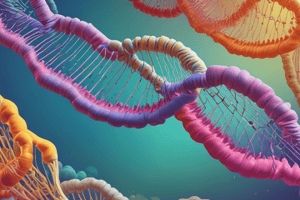Podcast
Questions and Answers
What is the 'effective population size' formula based on the text?
What is the 'effective population size' formula based on the text?
- Ne = (Nf + Nm) / 4 x Nf x Nm
- Ne = Nf x Nm / 4(Nf + Nm)
- Ne = Nf x Nm / 4Nf + Nm
- Ne = 4 x Nf x Nm / (Nf + Nm) (correct)
In a population of 100 females and 2 males, what percentage of genes does each male contribute to the population?
In a population of 100 females and 2 males, what percentage of genes does each male contribute to the population?
- 5%
- 10%
- 25% (correct)
- 15%
What does 'Ne' represent in the context of genetics as discussed in the text?
What does 'Ne' represent in the context of genetics as discussed in the text?
- Effective number of breeding males
- Effective number of breeding females
- Effective population size (correct)
- Total number of individuals in a population
If only 10 males are involved in mating out of 100 males in a deer population, what is the effective population size (Ne) according to the text?
If only 10 males are involved in mating out of 100 males in a deer population, what is the effective population size (Ne) according to the text?
How does a small 'Ne' affect a population according to the text?
How does a small 'Ne' affect a population according to the text?
What is the main factor that determines the magnitude of genetic drift according to the text?
What is the main factor that determines the magnitude of genetic drift according to the text?
What is the primary assumption of the Hardy-Weinberg principle?
What is the primary assumption of the Hardy-Weinberg principle?
Based on the given data, what is the value of the chi-square test statistic?
Based on the given data, what is the value of the chi-square test statistic?
What could cause genotype frequencies to deviate from Hardy-Weinberg equilibrium?
What could cause genotype frequencies to deviate from Hardy-Weinberg equilibrium?
In the context of prion diseases, what is the primary difference between normal and abnormal prions?
In the context of prion diseases, what is the primary difference between normal and abnormal prions?
What is the characteristic microscopic feature of spongy brain diseases?
What is the characteristic microscopic feature of spongy brain diseases?
What is the primary mechanism by which abnormal prions cause damage in prion diseases?
What is the primary mechanism by which abnormal prions cause damage in prion diseases?
At equilibrium, what is the relationship between the forward and reverse mutation rates?
At equilibrium, what is the relationship between the forward and reverse mutation rates?
If the forward mutation rate (u) is 1 x 10^-5 and the reverse mutation rate (v) is 5 x 10^-6, what is the equilibrium frequency of the allele 'A'?
If the forward mutation rate (u) is 1 x 10^-5 and the reverse mutation rate (v) is 5 x 10^-6, what is the equilibrium frequency of the allele 'A'?
Which of the following processes affect evolutionary rates at a much faster pace than mutation-selection equilibrium?
Which of the following processes affect evolutionary rates at a much faster pace than mutation-selection equilibrium?
What is the primary reason why mutation-selection equilibrium is rarely observed in natural populations?
What is the primary reason why mutation-selection equilibrium is rarely observed in natural populations?
If the population size (N) is large enough, what is the effect of genetic drift on allele frequencies?
If the population size (N) is large enough, what is the effect of genetic drift on allele frequencies?
Which of the following processes is not mentioned in the text as affecting evolutionary rates?
Which of the following processes is not mentioned in the text as affecting evolutionary rates?
What is the value of the allele frequency $q$?
What is the value of the allele frequency $q$?
What is the expected genotype frequency for the homozygous recessive genotype $aa$?
What is the expected genotype frequency for the homozygous recessive genotype $aa$?
What is the expected genotype frequency for the heterozygous genotype $Aa$?
What is the expected genotype frequency for the heterozygous genotype $Aa$?
What is the chi-square statistic ($
eq^2$) calculated for this population?
What is the chi-square statistic ($ eq^2$) calculated for this population?
What is the degree of freedom (d.f.) for the chi-square test in this case?
What is the degree of freedom (d.f.) for the chi-square test in this case?
Which of the following is NOT a basic question in population genetics according to the text?
Which of the following is NOT a basic question in population genetics according to the text?
What is the primary factor that determines the magnitude of genetic drift in a population?
What is the primary factor that determines the magnitude of genetic drift in a population?
If a population is in Hardy-Weinberg equilibrium, what can be said about the relationship between the forward mutation rate (u) and the reverse mutation rate (v)?
If a population is in Hardy-Weinberg equilibrium, what can be said about the relationship between the forward mutation rate (u) and the reverse mutation rate (v)?
What is the primary assumption of the Hardy-Weinberg principle according to the text?
What is the primary assumption of the Hardy-Weinberg principle according to the text?
Which of the following processes is NOT mentioned in the text as affecting evolutionary rates at a much faster pace than mutation-selection equilibrium?
Which of the following processes is NOT mentioned in the text as affecting evolutionary rates at a much faster pace than mutation-selection equilibrium?
How does a small 'effective population size' (Ne) affect a population?
How does a small 'effective population size' (Ne) affect a population?
Flashcards are hidden until you start studying




